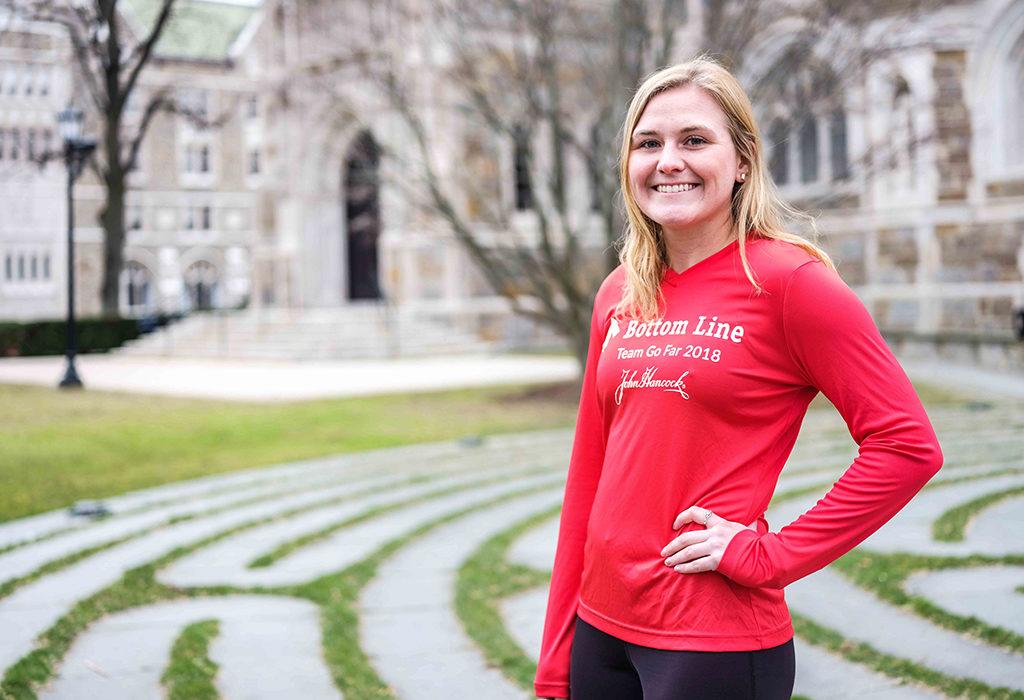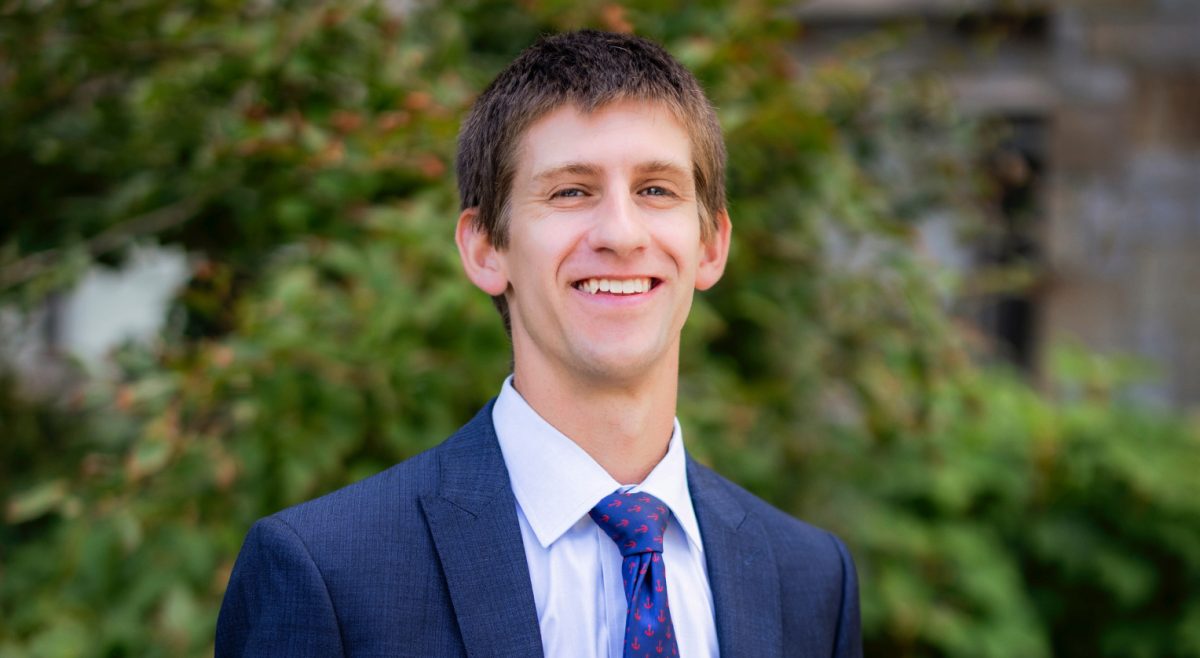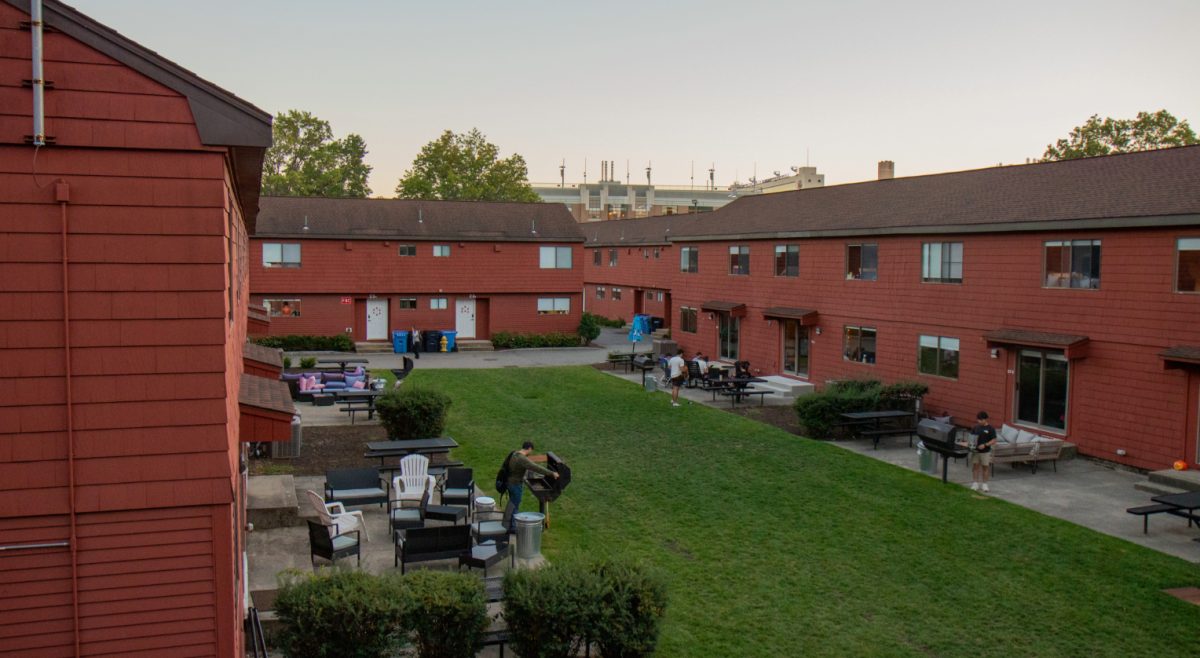Before college, she never ran competitively, but this Monday, Lori Niehaus, MCAS ’18, will be one of the 30,000 people lining up to run the Boston Marathon.
A soccer player in high school, she started to miss the challenge of sports as an undergraduate. She knew that she wanted to run the Boston Marathon after attending a meeting during sophomore year with her freshman topic advisor. He had a group of graduating seniors there and he asked them to share one piece of advice with the underclassmen.
“This one girl was like ‘you should run the marathon,’” Niehaus said.
Although she had never been a runner, she just decided to do it—in her eyes, it was the best thing she’s ever done. Niehaus and her friend, Sayles Day, MCAS ’18, decided that they would run a marathon together. Their plans didn’t pan out, unfortunately, since Day sustained an injury, making it impossible for her to participate.
When Niehaus decided to run this year, she said that although her friends and family weren’t necessarily surprised, they were concerned about her tendency to overextend. As a senior, she’s incredibly busy—Niehaus is currently working on her thesis—and worried that she would be overcommitting by planning to train for a 26.2 mile run.
“When I explained why I wanted to do it and that it was really important to me, they were definitely supportive,” she said.
Once she decided to run, Niehaus had to undertake arguably the most difficult part of running the marathon: fundraising. After finding an organization that she felt that she aligned with and wanted to run with—Bottom Line—she set upon reaching the $10,000 goal. Although the task seemed daunting, it was made easier by the fact that Niehaus strongly supports Bottom Line’s mission.
As an organization that works with low-income and first-generation college students, Bottom Line aims to not only help students get into college, but ensure they succeed once they get there. This focus on sustainability is what attracted Niehaus to the group when a friend of hers brought it to her attention.
This is something that Niehaus has been passionate about during her time at Boston College. As a member of GlobeMed, a group that focuses on partnership and sustainability rather than the “trip” element of service, she has seen the importance of accompaniment and being present with other people.
Feeling united with others is something that Niehaus has carried with her from high school—to this day, she and her former soccer teammates all write the number 11 somewhere on themselves before any athletic event in memory of their former teammate who passed away. Everyone who went on to college athletics can still be found with an 11 somewhere—whether it be on their wrist or their cleats.
“She’s my soccer sister,” Niehaus explained.
She’s found community and support in her friends here as well—they were her go-to people when she was tasked with her incredible fundraising goal as she looked for different ways to raise money. In addition to friends and family, Niehaus reached out to people that she hadn’t seen in a while, but thought would be interested in the cause she was running for.
“You just have to really use all of your resources—as in, contacting anyone who remotely knows you,” she said, further explaining her strategy. “Hey, this is who I am, this is what I’m doing.”
She also worked with other runners to have dual events.
“It’s half the profits for each of us, but at the same time, it’s like, we’re in this together,” Niehaus said, once again returning to the idea of togetherness and accompaniment.
Although she enjoys being present with other people, she finds it easiest to run alone. “I’m kind of a loner when it comes to running,” she explained.
She does note, however, that running with others is the best way to ensure that she actually goes on the run. She said that running allows her mind to wander—this is a good thing for Niehaus, as not thinking helps the time pass more quickly when she’s running long distances.
Niehaus uses music to push herself. While she says she runs at an inconsistent speed, it often moves to the beat of the song. Her marathon playlist consists of any songs she likes and she puts it on shuffle to change up the pace of every run.
Although her training is tapering off now that the marathon is right around the corner, during her peak weeks she was running five days per week after class—preferably whenever weather was warmest. During her peak training, she would run 2 miles on Monday, 7 miles on Tuesday, and 9 on Thursday before her Saturday long run.
“Lori is successful in training because she is so tenacious,” Day said in an email. “Lori does not shy away from discomfort, and has admitted that when it comes to the marathon (this will be her second): ‘It’s not that I love running, it’s that I love the challenge.’”
To help its runners undertaking this challenge, Bottom Line is part of a marathon coalition that connects runners to coaches that plan runs and routes for participants to practice with. Niehaus said that she tried to attend as many of these as she could, and she tries to run on the actual marathon course as much as possible to prepare.
When she does reach mile 21 for real next Monday, she’s going to have a group to greet her.
“They’re so excited to cheer me on and be a part of that,” Niehaus said of her friends.
Her belief in solidarity is one that she plans to continue as a graduate: She’s accepting a Fulbright position in Malaysia, where she will be teaching English for one year. Although she eventually would like to work in public health, Niehaus explained that she believes education is so crucial to many facets of life that she feels the two are related.
Integrating disciplines is something that she believes BC has done well. She specifically cites Magis, the idea of “being more,” as something that she has strongly identified with during her time at BC.
“Obviously that translates into running and training for a marathon,” she said.
She said that whether or not you decide to run a marathon isn’t the point. The takeaway should be that you have to challenge yourself to do something that makes you uncomfortable.
“I think that translates to every aspect of my BC experience,” Niehaus said. “We constantly need to adapt and put ourselves into situations to learn and be better versions of ourselves. That’s what running the marathon has meant to me.
“If you’re comfortable, you should move.”
Featured Image by Sam Zhai / Heights Staff







